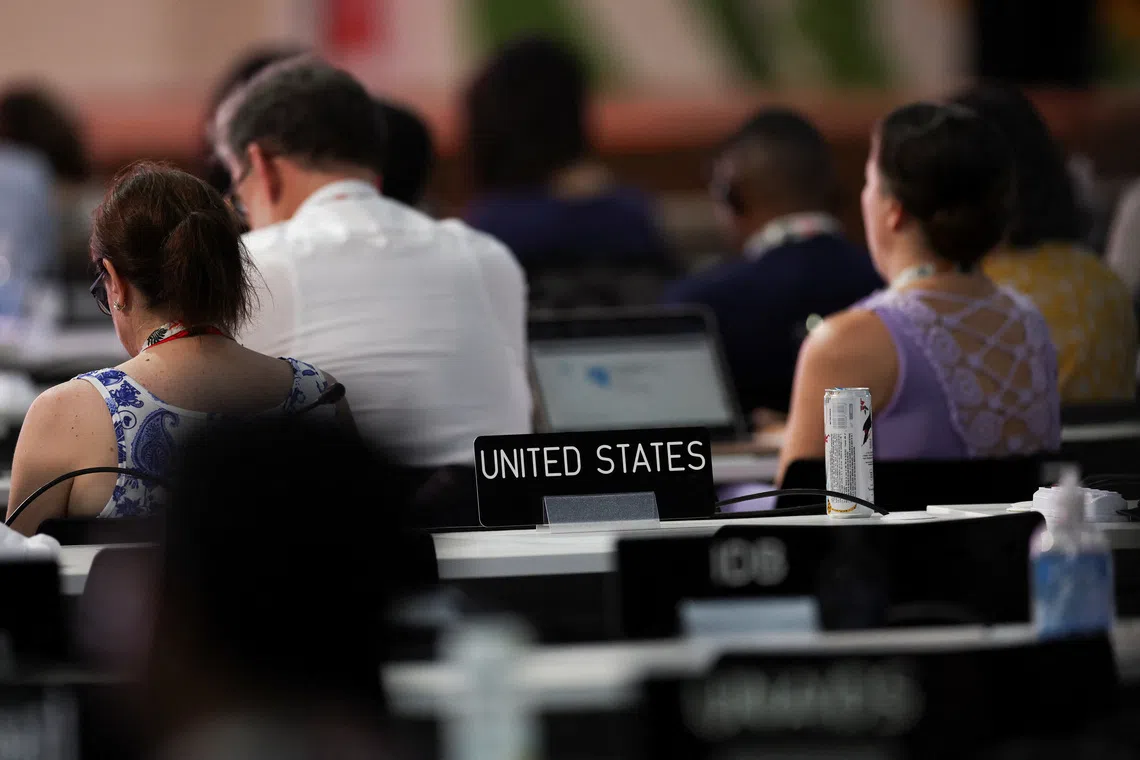COP30 delegates dig into toughest issues as climate talks enter final week
Sign up now: Get ST's newsletters delivered to your inbox

Empty seats meant for the US delegation at the COP30 conference in Belem, Brazil, on Nov 17.
PHOTO: REUTERS
Follow topic:
BELEM, Brazil – Government ministers from around the world were preparing for a final few fraught days of talks at the UN climate summit as they bid to secure a deal that demonstrates global resolve amid increasing assertiveness from developing nations.
The job will not be easy. Countries are now digging into some of the toughest issues – many of which have been left off the formal agenda to ensure the talks keep moving even if one issue gets hung up.
“The time for performative diplomacy has now passed. Now is the time to roll up our sleeves, come together and get the job done,” UN climate chief Simon Stiell told delegations in a speech opening the second week of the conference.
Brazilian President Luiz Inacio Lula da Silva is expected to arrive on Nov 19 to help rally consensus among parties at the summit in the Amazon city of Belem ahead of Nov 21’s final scheduled session.
Developing nations flex more muscle
Asked if there was any one issue dominating the talks, COP30 president Andre Correa do Lago replied: “Everything, everything. It’s very complicated.”
New dynamics in climate diplomacy have seen China, India and other developing nations flex more muscle in 2025, while the European Union is hobbled by weakening support back home and the once-dominant United States has skipped out altogether.
Danish Climate Minister Lars Aagaard said the EU was showing leadership but that it was still early in the negotiations.
“Today is Monday, so I think it’s a bit early to say who is active and who is leading in these negotiations. We can evaluate that when we come to the end,” he said.
Brazil’s top goal for COP30 is to deliver an agreement that reaffirms the 2015 Paris Agreement, while acknowledging its shortcomings by laying out clear plans for future climate action.
Mind the gaps
Over the last week, negotiators had a chance to air their differences on three key issues: climate finance, unilateral trade measures and planned emissions cuts that do not go nearly far enough.
The Paris treaty’s central goal, to prevent warming beyond 1.5 deg C above pre-industrial levels, will be missed.
Current emissions trends have the world warming by at least 2.3 deg C
“It is a must-have to be able to talk about how we close the gap going forward,” Mr Bjelland Eriksen told Reuters.
A bloc of developing countries is also seeking a payment schedule to ensure wealthy countries follow through on promises made at 2024’s COP29 to annually deliver US$300 billion (S$391 billion) in climate finance by 2035
Progress in some, but not all, areas
Denmark, which produces the majority of its electricity from wind, announced a new binding target to slash its greenhouse gas emissions by at least 82 per cent by 2035, compared with 1990 levels.
“We think this is the highest, most ambitious number of any country in the developed world,” Mr Aagaard said.
Denmark’s target is substantially more ambitious than the EU’s overall commitment to a 66.25 per cent to 72.5 per cent emissions cut by 2035.
South Korea, which operates the world’s seventh-largest fleet of coal-fired power stations, announced it would stop building new coal plants and phase out nearly two-thirds of existing ones by 2040. The rest would also be phased out, though the timeline was not specified.
However, the transition away from fossil fuels in developing countries remains a vexed issue.
Indonesia’s plan to retire 6.7 gigawatts of coal-fired power plant capacity by 2030 is at risk of failure owing to stalled disbursal of funding from rich countries.
“If there is no one really willing to jump in to finance the coal phase-out, then we will have to think about whether phase-out is actually the best option,” Mr Paul Butarbutar, head of the Indonesia Secretariat of the Just Energy Transition Partnership programme, told Reuters. REUTERS

